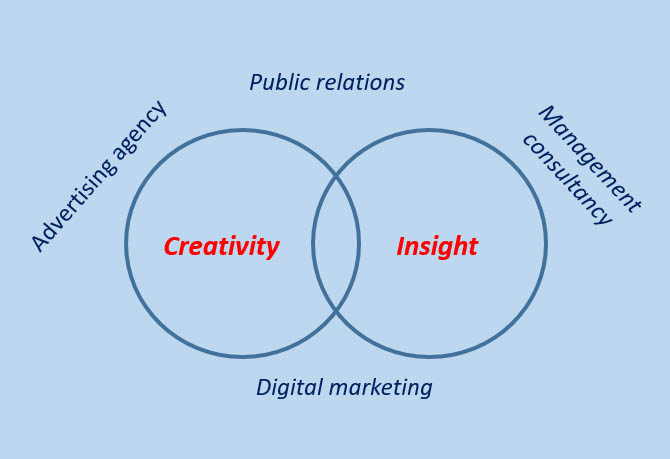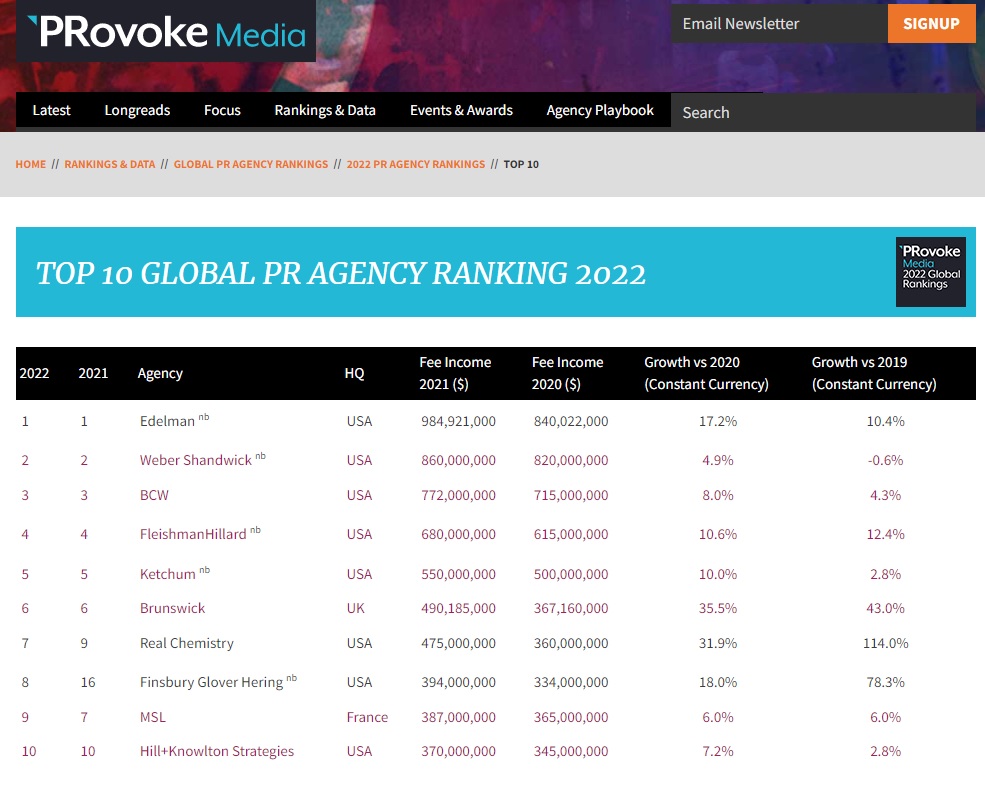Briefing: the public relations consultancy business

About the author
Richard Bailey Hon FCIPR is editor of PR Academy's PR Place Insights. He teaches and assesses undergraduate, postgraduate and professional students.

In public relations, more people work in-house for organisations than work for a public relations consultancy or as an independent practitioner. Yet, with the exception of the Government Communication Service (GCS), there are few large in-house employers with regular graduate recruitment programmes, which leaves consultancies as the obvious choice for graduate job seekers and newcomers to public relations.
This briefing is written with these groups in mind. It covers what job seekers should know about the state of the sector.
Agency or consultancy?
I acknowledge that I’ve lost the argument – agency is the commonly-used term, and even trade association the PRCA dropped the C word from its name in 2016 as it changed to the Public Relations and Communications Association from the Public Relations Consultants Association – but I still think it’s helpful to recognise the distinction.
Traditionally, agents have worked for a percentage commission: think estate agents, advertising agents or sports agents. Consultants work for a fee in recognition of their time and their expertise (think management consultants or consultants working in private healthcare).
Higher fees – and therefore higher salaries – come to those servicing larger clients, and to those offering expertise in specialist areas (eg crisis and reputation management; financial public relations) and growth sectors (eg healthcare, technology).
The flipside of this is that salaries for consumer public relations specialists are comparatively low, especially given the remorseless pressure to be creative while promoting what are often undifferentiated products and maintaining good client relationships in the face of fierce competition.
As a clue to orientation, if the language used by team members involves talk of ‘brands’, they’re probably working in marketing PR. If the discussion revolves around ‘reputation’, they’re probably focused on corporate PR.
As an alternative to agency or consultancy, you could think of yourself as working for a professional services firm, the phrase that covers lawyers, accountants and management consultants.
Business basics
Public relations consultancy is a simple business. You have certain fixed overheads (office costs, salaries) that you need to meet through fee income. To expand, you need to offer new services to existing clients, and/or win new client business, while retaining your existing client business.
The challenge is to juggle the demands of winning new business, which is a cost to your team, with retaining existing clients. One regular criticism of public relations consultancies is that their top team is deployed to win pitches, but rarely seen thereafter as the day to day business is delegated to junior (and cheaper) members of staff.
Expansion is challenging. Most recruiters say that they struggle to find enough talented people: that means that those with a proven track record of winning new business and delivering client service are highly sought after, and can negotiate larger salaries. (Note to job seekers: many consultancies are constantly seeking talent. You don’t have to wait for them to advertise to apply.)
Yet some teams over-expand to meet the demands of a large client. If that client reduces its commitment, or ends its contract, that leaves an overlarge team to pay out of reduced fee income.
So most teams aim to expand steadily, and often make strategic use of independent consultants to meet current needs or to fill gaps in expertise.
Winning business
The preferred route to winning new business is to become recognised as an industry thought leader. The goal is for new business to come through referral and recommendation. Thought leadership can be achieved through awards wins, through sponsorship of events or research reports, through appearances on speaker platforms and through articles in the trade press and a regular flow of content online.
A good example of consultancy thought leadership is the annual Edelman Trust Barometer, released each year to coincide with the World Economic Forum meeting in Davos.
The goal of thought leadership is to be front of mind when it comes to selecting consultancies. Those shortlisted are usually then invited to ‘pitch’ for the account, presenting their ideas in competition with those of other shortlisted teams.
Business models
Public relations consultancies are private businesses, run for the financial benefit of their owners. These owners can be:
- Holding companies (often stock market listed). Many famous consultancies, while appearing independent, are in reality part of a larger marketing services group (such as WPP, Interpublic, or Omnicom).
- Partners. The Limited Liability Partnership (LLP) is a favoured model for other professional service firms (lawyers, management consultants), but is less typical in public relations. Partners own a share in the business, and can earn handsome salaries and bonuses.
- Directors. Most consultancies are privately owned, with the risks and rewards going to the directors. Even the world’s largest, Edelman, is still a privately-held family firm now into its second generation of family leadership.
There are few barriers to entry into the sector. Anyone, whether qualified or not, can set up their own consultancy and compete for client business. I have even noticed a trend for new graduates to set up as independent consultants before working for someone else.
This makes the sector highly dynamic. These new entrants, working from home for lower overheads than those operating with higher fixed costs, can often undercut incumbents. Some will emerge as strong players in certain sectors. What then often happens is that they are acquired by a larger consultancy, keen to ‘buy in’ talent and new clients. This can provide a handsome payout to the original owners, though they’re usually locked in for a period of time during which they continue working for the new owners.

Sectors and specialisms
As we have seen, one route to expansion is to offer a wider range of services to existing clients. This has led some teams to promote themselves as ‘full-service agencies’ offering a range of marketing, promotional, design and publishing services, typically to small and medium (SME) clients.
The alternative is to become a specialist public relations consultant and to earn higher fees through a higher-value specialism such as crisis and reputation management, or by expertise in growth sectors such as technology and healthcare as already noted.
International networks
The driver for international expansion has been global corporations wanting to consolidate their public relations in one international network, or with one lead agency responsible for international programmes.
This is an expensive route, only available to the largest consultancies, and even then it’s not a guarantee of success, because a team with a strong reputation in New York or London may not be able to deliver equal levels of service in Mumbai or Shanghai.
Small or medium sized consultancies tend to choose a series of partners or an existing international network to work with.
Competitive forces
When the PRCA was founded as the Public Relations Consultants Association in 1969, the need was for public relations consultancies to be seen as distinct from better-funded and better-understood advertising agencies (the second half of the twentieth century was the high water mark for mass media and therefore of advertising through paid-for media).
Now, in a world of paid-earned-shared-owned (PESO) media, it’s hard to point to any remaining distinction between public relations consultancies and advertising agencies – at least for those operating within marketing communications. That means they compete for clients and for industry awards such as Cannes Lions. If there is any remaining distinction, it’s the subtle one that public relations consultancies talk about ‘earned first’, the assumption being that advertising agencies still revolve around ‘paid first’ promotions.
For those working in reputation management, competition is more likely to come from management consultancies, some of which have been busy acquiring creative and public relations teams; or from law firms with expertise in reputational risk and media law.
Then there is competition and overlap with digital agencies offering search marketing and search engine optimisation services. The line between digital marketing and public relations is also blurred in the online age, and digital marketing agencies have also been acquiring public relations talent, in acknowledgement that relationships remain key in the digital age when earning media coverage, gaining valued backlinks, or developing partnerships with influencers.
To state it simply, public relations teams must now compete with advertising agencies for ‘creativity’; and they must compete with management consultancies for ‘insight’.
The future
Some consultancies have been keen to drop the term ‘public relations’ on the grounds that people associate this with ‘traditional PR’ which is assumed to mean media relations. Some have adopted the term ‘communications’, believing it to be a broader term that encompasses stakeholder relations beyond media relations. (The PRCA renamed itself the Public Relations and Communications Association in 2016 in recognition that its members were drawn from in-house teams and independent practitioners, not just the large consultancies).
Fashion comes full circle though, and some have been reinstating the term public relations (not PR, note) in recognition that the role is still valued and distinctive in a world of digital marketing.
The future probably belongs to those best able to find the sweet spot where creativity overlaps with insight, and to combine the doing roles (content, SEO, media relations) with an advisory function.
Are you the ideal candidate?
Historically, candidates were hired who had demonstrably strong writing skills and expertise in media relations. Today, content marketing is the phrase that covers these areas, recognising that the media landscape has grown to include social media influencers. That’s why graduates with a well-developed presence on social media and good placement work experience have often been highly sought in the graduate jobs market.
Now, there are multiple demands on the ideal candidate: they should be strong relationship managers (covering client, media and influencer relations), excellent project managers, strong content producers (writing and media skills), data analysts, and creatives.
It’s hard to imagine one person being equally accomplished in all these areas. And that’s the challenge. Public relations has traditionally hired generalists. Contrast that with advertising teams, with the separation between the planners, the creatives, the media buyers and the client handlers.
So rather than spreading yourself too thinly across all these areas, it makes sense to develop your strength in one or more of them and look to fit into a team where others have complementary skills.
Remember, recruiters will be above all looking for team players.
UPDATE: This article was first published on 24 April 2019. It was updated with new information on 20 March 2023.
Further reading
PRovoke Media (formerly The Holmes Report) is a good source of news and commentary on the global public relations consultancy business, with Arun Sudhaman its star reporter.
PR Week is focused on the intersection of public relations and advertising. It produces an annual ranking of PR agencies. Editor in chief Danny Rogers is author of Campaigns That Shook the World.
PR Moment reports on issues and trends affecting those in the sector and runs conferences and annual awards. In the PRmoment podcast, publisher Ben Smith interviews many consultancy leaders and is well informed on the business side of public relations.
Grow, Build, Sell, Live: A Practical Guide to Running and Building an Agency and Enjoying It by Richard Houghton and Crispin Manners is published in the PRCA Practice Guides series.


